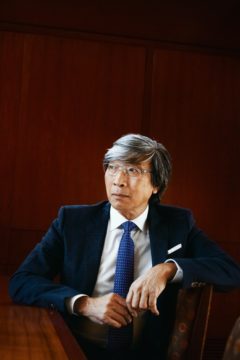Stephen Witt in The New Yorker:
 In the mid-nineteen-eighties, Lee Iacocca, the celebrated executive who had run both Chrysler and Ford, visited the Los Angeles laboratory of Patrick Soon-Shiong, a surgeon at U.C.L.A. Iacocca’s first wife had died of Type 1 diabetes a few years earlier; he was searching for a cure. Soon-Shiong, who was in his thirties, specialized in pancreas transplant, a risky treatment reserved for severe diabetics. Soon-Shiong was a skilled surgeon who had trained under organ-transplant pioneers, but he’d grown unhappy with the procedure: pancreas transplants carried a high risk of organ rejection, and he didn’t feel that the outcomes were worth the danger. He wanted to shut down U.C.L.A.’s pancreas-transplant program and embark on a new line of research. Instead of replacing the entire pancreas, Soon-Shiong would replace only the insulin-producing islet cells inside it.
In the mid-nineteen-eighties, Lee Iacocca, the celebrated executive who had run both Chrysler and Ford, visited the Los Angeles laboratory of Patrick Soon-Shiong, a surgeon at U.C.L.A. Iacocca’s first wife had died of Type 1 diabetes a few years earlier; he was searching for a cure. Soon-Shiong, who was in his thirties, specialized in pancreas transplant, a risky treatment reserved for severe diabetics. Soon-Shiong was a skilled surgeon who had trained under organ-transplant pioneers, but he’d grown unhappy with the procedure: pancreas transplants carried a high risk of organ rejection, and he didn’t feel that the outcomes were worth the danger. He wanted to shut down U.C.L.A.’s pancreas-transplant program and embark on a new line of research. Instead of replacing the entire pancreas, Soon-Shiong would replace only the insulin-producing islet cells inside it.
Soon-Shiong set up a laboratory at the Veterans Affairs hospital in West L.A. There, working with a staff of three, he began sourcing islet cells from pigs and human cadavers. “The lab was primitive,” Iacocca’s daughter Kate Hentz told me. Hentz had toured many such research facilities with her father; Soon-Shiong, she sensed, was a maverick.
She and her father were impressed. “Patrick is just brilliant,” Hentz said. Soon-Shiong was extraordinarily charismatic; he was fit and trim, wore rimless glasses, and had a long shag haircut. He was Chinese by ancestry and South African by birth, and he spoke with a soft Anglo-South African accent. He could talk for hours about medicine and the human body, then switch to history, or business, or literature. Soon-Shiong’s wife, Michele B. Chan, was an actress who’d played a marine biologist on a Canadian TV show; the couple lived in a modest bungalow in Brentwood. “Their house was just adorable,” Hentz said. “You could feel they had all these little creative touches, without being overboard.” Among those touches were his-and-hers doorframes, cut into silhouettes of their profiles.
Iacocca agreed to fund Soon-Shiong’s research, and also encouraged him to commercialize his work. Soon-Shiong was hesitant. “He was really excited about what he was doing, but kind of quiet about it,” Hentz said. “He was modest. He was humble.” Iacocca won him over.
More here.
